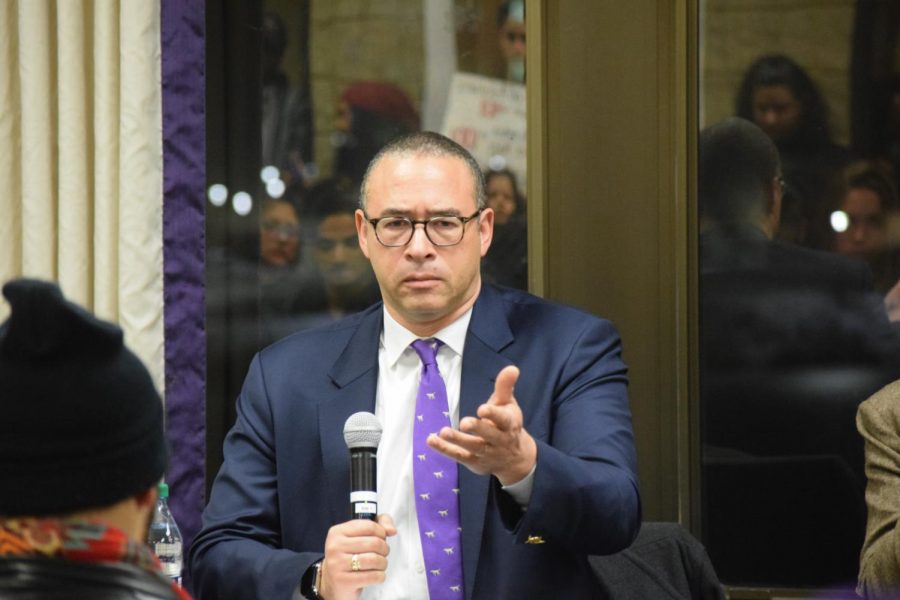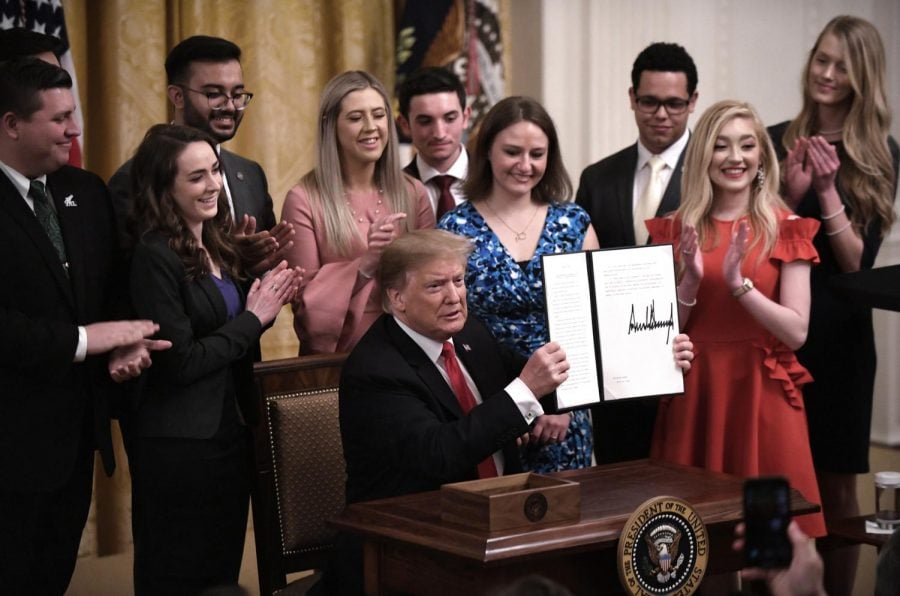Trump issues executive order on free speech, though impact at Northwestern remains unclear
Olivier Douliery/Abaca Press/TNS
U.S. President Donald Trump holds a signed executive order to require colleges and universities to “support free speech” on campus or risk loss of federal research funds during an event in the East Room of the White House on Thursday, March 21, 2019.
April 10, 2019
President Donald Trump last month issued an executive order directing colleges that receive federal funding to promote “free inquiry” or lose the funding, a clear step in addressing what the Trump administration says is an effort in higher education to undermine the views of conservative students and speakers.
The order mandates that public schools comply with the laws and regulations related to the First Amendment and that private schools like Northwestern abide by their own institutional policies regarding freedom of speech. It calls on 12 federal agencies to work with the White House Office of Management and Budget to ensure schools comply with these laws and policies, though it was scant on details of its enforcement.
The president offered few additional details, but said at a signing ceremony that it was necessary amid the “censorship and coercion” some campuses have placed on students. He referenced a February incident when a conservative activist on the campus of the University of California, Berkeley was punched in the face after recruiting for a conservative organization
“We’re delivering a clear message to the professors and power structures trying to suppress dissent and keep young Americans, and all Americans… from challenging rigid, far-left ideology,” Trump said.
But any change in policies or procedures at Northwestern is unclear. While public colleges are bound by the First Amendment, private colleges are not, though the federal government has legal authority to impose such measures to schools it funds. The order directs the OMB to “take appropriate steps” to ensure private schools comply with their “stated institutional policies regarding freedom of speech” or risk losing federal research grants, though it kept safe money related to federal student aid programs.
University spokesman Bob Rowley said the right to freedom of expression and speech is “part of our values, and it predates the executive order — and this practice continues at the University as it always has.”
The vagueness of the order has worried some higher education groups that implementation would be inconsistent across schools and points of view. Others said the problem was nonexistent.
“No matter how this order is implemented, it is neither needed nor desirable, and could lead to unwanted federal micromanagement of the cutting-edge research that is critical to our nation’s continued vitality and global leadership,” Ted Mitchell, the president of the American Council on Education, said in a statement. “To minimize the order’s ill effects, we urge the Trump administration to consult with a diverse set of stakeholders and take a wide range of views into account before implementing its provisions.”
University President Morton Schapiro stopped short of directly criticizing the order, though he questioned whether the act would enhance free speech on college campuses.
“It’s essential that our colleges and universities continue to promote freedom in scholarship and in expression,” he said in a statement to The Daily. “It’s unclear whether an executive order is a constructive or necessary means toward that end.”
Under the leadership of President Schapiro and Provost Jonathan Holloway, Northwestern has shown itself to be a staunch supporter of free speech.
Holloway has stood by his decision to let a controversial visiting scholar — whose past work has been criticized for promoting racist and sexist views — stay at NU over objections from many students and faculty who say his presence is actively harming the University environment.

Provost Jonathan Holloway takes questions from students asking him to reverse his decision allowing a controversial visiting scholar to remain on campus.
The weekend the executive order was issued, Holloway was invited to speak at Emory University in Atlanta during a free speech and academic freedom conference. A recording of his speech was not available, though he said Northwestern will “continue to abide by our practice of welcoming ideas from across the spectrum and respecting the right of people to speak up.”
“When we invite people, they will have their invitation respected,” he said via email, referring to invitations offered to guest speakers. “The vast majority of the time, this invitation will garner little attention or controversy. Every once in a while, as you know, the situation is different. In those occasions, we will still strive to honor our core principles respecting academic freedom and free speech.”
Email: [email protected]
Twitter: @_perezalan_


